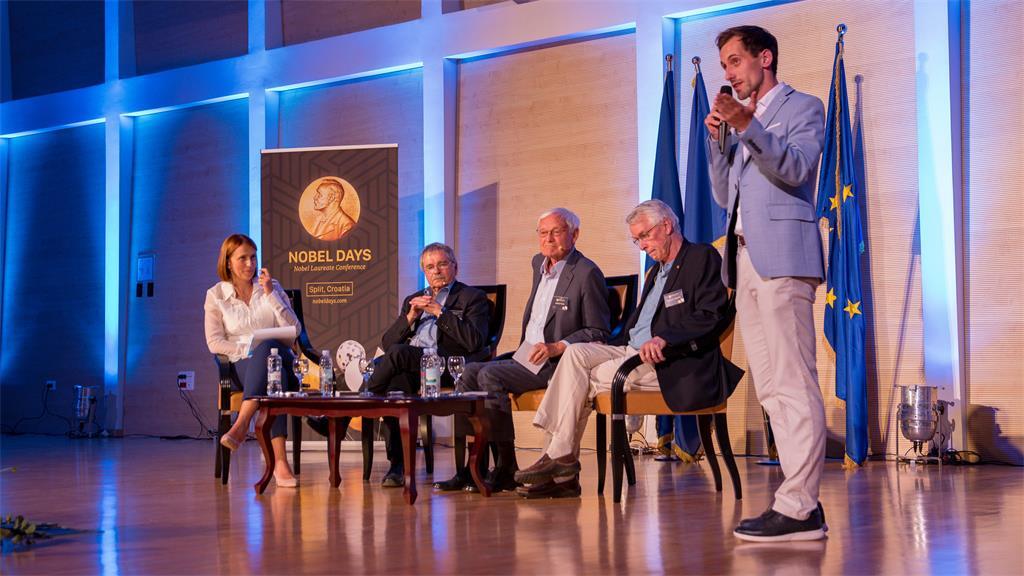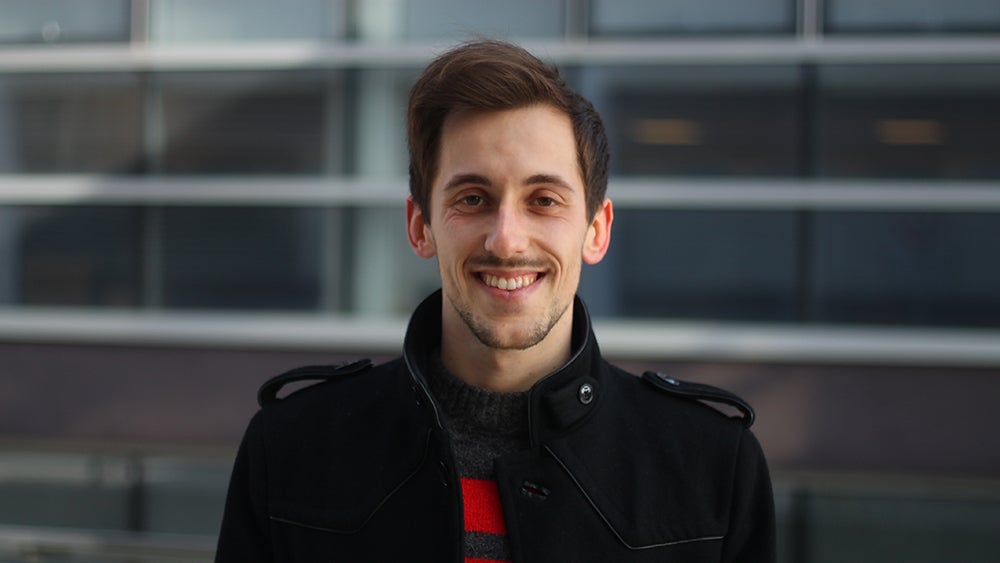I began my postdoc at HMS in February, coming from a medical doctor position in Croatia. My research interests are in neuroscience — in particular, sleep medicine, the gut-brain axis and learning and memory. I’m currently working on the gut-brain axis and oxidative stress during sleep deprivation with a great team of people from the Rogulja Lab. In addition to research, I love organizing conferences and special events – programs that bring together scientists across different countries, and that sometimes connect science with other aspects of society, such as sports or music.
Portrait photo courtesy of the Student Society for Neuroscience, NeuroSplit
What first drew you to neuroscience?
I did all my studies in Split, Croatia. During my earlier childhood, I didn’t have any plans, like I want to do this, or I want to do that. I was just going day by day, exam by exam. During high school, though, I started to feel a need to contribute to society more, to give back. I started organizing events. Really small social events, nothing special. Then, loving physics and medicine, I enrolled in medical school.
In my second year, I attended a conference – it was a neuroscience congress – and I really enjoyed it. I met some students from Zagreb, and I liked the idea that they have this society and they organize lectures, workshops and all that sort of stuff. And I just thought, “We’re missing out on this!” In Split, we don’t have anything similar. So I founded a Neuroscience Society at our med school, called NeuroSplit. A few people came to me and said, “I’m really interested in what you’re doing, can I maybe join and help you?” And it was really, really cool! We started organizing small and programs lectures first, some for students and some for the general public. And the response from the people was really great. The attendance rate was great.
That’s fantastic.
Yes, and in my third year, we thought, “Okay, all these lectures, all these workshops, they’re really nice, but let’s organize something really cool.” And then we thought, “Why not organize a congress?” (Just to give you some background, none of us had any experience in organizing conferences. Our school rarely hosted those.)
And we thought, “Why not? Why not organize a conference here?” And the idea of that conference, which is called Practical Knowledge for Students, was basically to teach the medical students, dental students and pharmacy students the most important practical knowledge they need for their future careers. So for medical students that would be suturing, CPR, wound care and that sort of stuff. The first round was in April 2017. I was leading that organization committee, and I was really skeptical whether anybody would even apply.
But they came as soon as applications were open! We had a stand at the medical school – it wasn’t online. You would just come to our volunteer station and write in your registration request, which was basically free. And I was so surprised when I came down. It was in the base floor of the faculty building and I saw probably 100 students there. I was like, “Whoa! Really? You’re that interested?” And basically we filled the conference with around 200 people in a day and a half. It was very, very quick. That first conference went by with maybe around 30-35 workshops and lectures in it and some social activities. And the next year I thought, “Okay, that went really well. Let’s step it up!”
So prior to the conference, I traveled to regional countries – Bosnia, Slovenia, Serbia, Hungary, Austria and others. The idea was to present to the medical students, dental students or pharmacy students in each country the idea of the congress and our aims. And maybe to try to get some students from each place to come to Split. Also, we had this idea to invite any speaker we wanted. Basically, our philosophy was the Nike slogan, “Just do it.” We thought, “Why not?” Like, why not invite Nobel laureates?
That’s a great attitude! I hear the Nobel laureates came.
Yep. I was surprised by how well this all worked. That second year of the conference, we had 300-400 participants from eight countries and a Nobel Prize winner, professor Erwin Neher came. In total, in three years we had more than 1000 students and professors from 27 countries and 34 nationalities worldwide. With two Nobel laureates. We also organized charity concerts with famous Croatian singers. And then we had Nobel Days, another conference, which brought four other Nobel Prize winners to Split. What’s great about this all is that it’s not like students are organizing some things, but senior professors are supervising. It’s 100% organization from the students. (Obviously with help from the staff and professors still, and support from the dean.)

A panel discussion with three Nobel Laureates during the Nobel Days Conference in Split, Croatia. Photo by Dalibor Gabela (University of Split School of Medicine).
I really, really love that student-driven aspect. I remember clearly the opening ceremony of one of these events, with the song by Alicia Keys, Empire State of Mind. We had this amazing girl from one of the high schools in Split and she sang that. It was all live. We had a violin, a piano also. It was incredible seeing all the people and the rector of the university, the dean, the mayor of the city and all that, all the people coming there! It was so surprising, and it was so emotional just going to the stage to give a talk.
I remember a moment when we had a round table with a few professors and students seated together. I remember just asking them, “Can you just introduce yourselves?” And then one said, “I’m from Russia, I’m from Lebanon, I’m from Spain.” I was like, “Whoa! You really came to Split.” It was so incredible. I remember that so clearly. And almost every time, with all these conferences, we really wanted to make the opening something special. With music, with songs, with lights, with the scenography and everything.
So you were in medical school the whole time that you were doing all of this?
Yeah.
Were you doing clinical work?
Yeah. None of the people actually had gap year, so they were all studying and in parallel organizing all this stuff. It was an interesting period in med school. I really loved the dynamic. I didn’t want to be just studying at med school. I really think that when you are at med school or wherever you are doing your studies, you should try to engage in community work. Because I think it can really help you later in life—not to help you live your life in a way like you’ll get paid better, you’ll get a better job or something, but because it fulfills you.
These people that organize the conferences, I think they’re each going to be future leaders in some field. I don’t know where, but definitely some field. The people I worked with are incredible, really… I remember all the sleepless nights. The university building would close around 10:00 in the evening. So many nights we stayed beyond that, till 3:00, 4:00, even 5:00 in the morning. That was crazy. Really crazy. But yeah. Everything in the end when I look at it retrospectively, I would do everything the same and just everything was worth it. I really do think so.
That’s quite a story! So what brought you to Boston?
After I finished med school, I worked in the hospital in Split for five or six months. And then I went to a hospital in Zagreb for another six months, more or less. But in between all that work, I went to MD Anderson Cancer Center in Houston, Texas to do an observership program for two weeks. I just emailed this professor there who was really, really nice person. He’s the chair of neuro-oncology there. I asked if I could come visit his hospital system and learn how neuroscience research is organized there, and he said yes.
So, true story, that was last year, September 2019. Exactly when we organized the Nobel conference. And I thought like, “Okay, since I’m in the US, why not maybe visit the best universities in the world, like Stanford, Harvard, MIT, Columbia?” And I literally just emailed people. Including my current PI, Dragana Rogulja. I asked to visit Harvard and see her lab, and she said yes.
And this is the crazy story. I came to the lab and basically talked to her for, I don’t know, two, maybe three hours. And at the end she told me, “You can maybe stay here and work here.” And I was like, “What do you mean I can stay here working?” She’s like, “You can really stay here as a postdoc.”
I was like, “This is not happening.” And she told me, “Just go home, chill, relax, think about it.” And the last words of hers were, I remember this so clearly were, “You’re not dreaming.”
So I came here in February! It’s my first time working with fruit flies. Unfortunately, COVID came but I think we’ve been really productive during the absence from the lab, just thinking of ideas and reading up on the latest research. And now we’re getting back to the bench. It’s still a bit unreal to be here.
What’s your research plan?
Well, we’re ultimately interested in what happens to the human body when it does not sleep. Our hunch is that maybe inflammatory markers go up and long term this might cause disease. Before I arrived, Dragana’s team discovered that sleep deprivation in flies causes oxidative stress in the gut. Flies which were sleep deprived and had elevated levels of oxidative reactive oxygen species lived dramatically shorter lives than controls. Around 15-20 days in comparison to 35-40 days — so it’s a really strong phenotype. And when you give those flies antioxidants – or when you activate specifically in the gut antioxidant enzymes — you can see an almost complete rescue of the lifespan, even without sleep or with very little sleep. Which I think is an amazing finding. Flies can live 35-40 days or so, without sleep or with little sleep just by having antioxidants or specifically activating antioxidant enzymes in the gut.
Now we’re developing the project even more, looking further at mouse models which were developed for these sleep deprivation studies alongside the flies. One goal is to see, how what exactly triggers this cell damage in the gut. Also, we want to analyze the gut microbiome. To see if any bacteria there are specifically elevated or reduced with sleep deprivation in the flies and mice, because we know that the gut microbiome can cause all sorts of problems. The gut microbiome is likely connected to many neurological diseases, such as Alzheimer’s, Parkinson’s, autism, depression, schizophrenia, and others. We’re interested in the broad picture and what can be translated into humans.
Are you doing more outreach work?
Yes! Currently, my colleagues from Croatia who worked on the conferences mentioned above and I are working on the Hot Science Balloon project to create a dynamic, open, inclusive, and globally active scientific community with the aim of exchanging ideas and inspiring scientific advancement. We are writing research papers summaries, interviewing notable experts such as Nobel Laureates and in the future we aim to organize virtual scientific meetings, networking events, as well as collaboration meetings. Anybody can join us!
If you would like to join Hot Science Balloon, discuss any of the topics in the interview or anything else, feel free to reach out at alen_juginovic@hms.harvard.edu!

